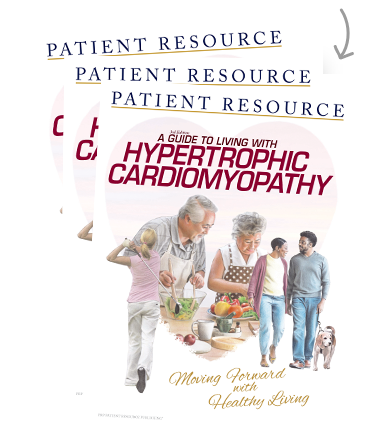Glossary
Words to Know
These definitions may help as you discuss your diagnosis and disease management plan with your health care team.
Antiarrhythmics: medications that help control irregular heart rhythms
Atrial fibrillation (AFIB): an arrhythmia (a type of irregular heartbeat)
Automated external defibrillator (AED): a medical device that can analyze the heart’s rhythm and, if necessary, deliver an electrical shock, or defibrillation, to help the heart re-establish an effective rhythm
Beta blockers: drugs that make your heart beat slower and with less force
Bradycardia: a heart rate slower than 60 beats per minute
Cardiopulmonary resuscitation (CPR): an emergency lifesaving procedure performed when the heart stops beating
Coronary artery disease: narrowing of the coronary arteries that supply oxygen and nutrients to the heart
Endocardium: the innermost layer of the heart
Epicardium: the thin layer on the surface of the heart
Hypertrophy: a condition in which muscle cells become larger, and so the muscle itself increases in size
Internal cardioverter defibrillator (ICD): an implanted device that can track the heart rate and shock the heart into a normal rhythm if it is too slow or abnormal
Myocardium: the heart muscle and thickest layer of the heart
Sarcomere: long, fibrous proteins in muscle tissue that slide past each other when a muscle contracts or relaxes
Scanxiety: a term used to describe the anxious feelings that arise in the time leading up to an imaging scan, during the scan, and while waiting for results
Sudden cardiac arrest (SCA): when the heart stops beating suddenly due to an electrical malfunction
Syncope: fainting, which is the temporary and sudden loss of consciousness
Tachycardia: a heart rate of more than 100 beats per minute



